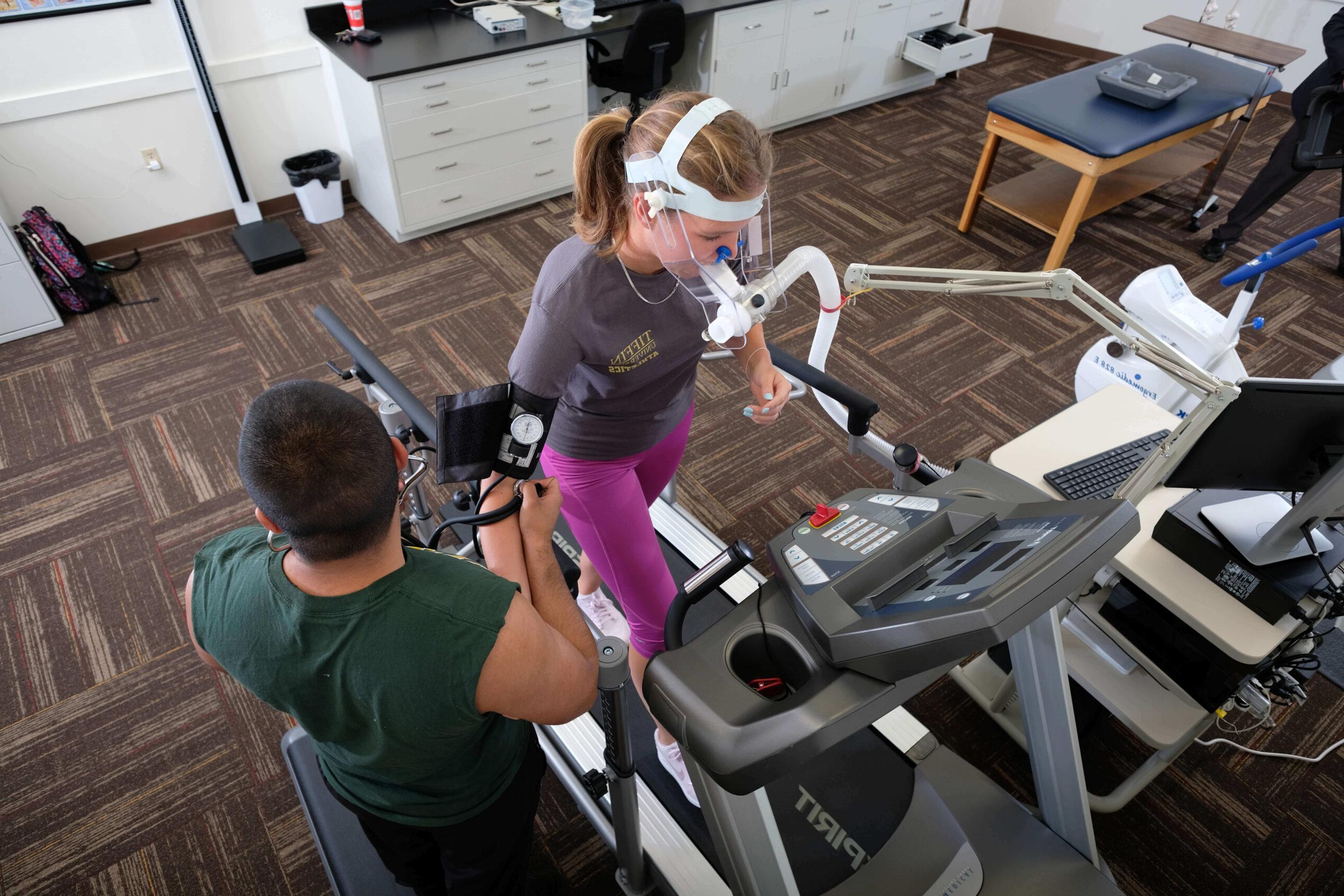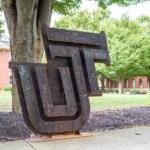
Bachelor of Science
Exercise Science
A VERY MOVING AND HIGHLY REWARDING CAREER
Do you aspire to a career that helps others live healthier lives? In Tiffin University’s exercise science program, you’ll dig deep into health and wellness as you explore the scientific foundations and core elements of exercise. Our comprehensive principles of modern exercise physiology will prepare you well for professional opportunities in the fascinating and fulfilling field of exercise science.
Program Highlights
The exercise science program is structured to provide you with a solid foundation for understanding how and why humans move. This interdisciplinary program includes courses from the fields of biology, chemistry and exercise physiology. Through this program, you’ll understand the essential role of physical activity and exercise in the prevention, treatment and recovery from a variety of disease conditions. You’ll also learn that, as a professional in the field, it becomes your responsibility to educate other people about the benefits of being physically active and the negative side effects of living a sedentary lifestyle. Upon successful completion of the required coursework, you can either seek employment in various areas of allied health or apply to graduate school in the sciences and health professions.
The Tiffin University Exercise Science Lab allows you to experience and practice the new knowledge you’ll acquire in the classroom. The lab has been equipped with instruments such as stopwatches, goniometer, Power Systems 70200 Flex-Tester, MyoTape, balance beam scale, BioScan 916 BIA, Hydraulic Hand Evaluation, compact metronome, heart rate monitor watch, incentive deep breathing exercise spirometer, calipers, Electromyography System (EMG), Monark Ergomedic 884E Sprint Bike, Dartfish Software and more.
In the Exercise Science Lab, you’ll perform studies on body composition, flexibility, maximum oxygen uptake (VO2max), musculoskeletal fitness and physiology, the biomechanics of exercise, thermodynamics and more.
TU’s program provides an opportunity for you to become certified in First Aid/CPR/AED, and certified as an exercise physiologist by the American College of Sports Medicine.
Professional Exercise Science Training
- Our professional program stays up to date with innovations and technological developments related to the latest scientific advances.
- Interactive classes enable you to apply your knowledge, preparing you for academia as well as professional growth.
- You’ll work one-on-one with highly experienced faculty-mentors.
- You’ll apply lessons from the classroom in our brand new, fully equipped Exercise Science Lab.
- Industry certifications are embedded into courses.
- Our students often go on to graduate school, pursuing further study in physical therapy, occupational therapy, physician assistant, medical school, athletic training and more.
Preparing You for the Real World
As part of a professional program, you’ll benefit from the experience of faculty members as you learn from their firsthand experiences and acquired knowledge. Our program’s instructors bring years of real-world work experience – in clinical exercise physiology; cardiovascular, pulmonary, and metabolic rehabilitation; strength and conditioning; and occupational/corporate health.
And while programs at most institutions emphasize “prep” for professional certifications, our program requires certification exams as a part of the curriculum. Three certifications are embedded into courses – First Aid/CPR, AED, Certified Exercise Physiologist and Certified Strength and Conditioning Specialist – and our faculty will work to provide you with the very best chance in pursuit of these important certifications.
A Practical, Professional Education
As a graduate of the exercise science program, you’ll be equipped with current, relevant field knowledge and career-ready skills, including:
- Biomechanics
- Physiology of exercise
- Basic health screening/interpretation
- Strength and conditioning
- Exercise testing and prescription
- Exercise programming for healthy, athletic and special/clinical populations
- Stress test/ECG interpretation
- Postural analyses
- Corrective exercise training for reducing muscular and skeletal pain
- Chronic disease development
- Lifestyle modification techniques
Active, Experiential Learning
Experiential learning is important in the study of exercise science in two key ways. The first is competence. For practitioners in the field, competence is the first thing they value when interviewing job candidates. Exercise science can be thought of as a healthcare discipline and incompetence can lead to ineffective or harmful programming. There simply is no substitute for competence and experiential learning is a safe and effective way to gain competence in the field.
Secondly, and very importantly, experiential learning allows you to build a professional network, which may help you to obtain future employment.
Bringing Knowledge to Practice
- You’ll actively serve as a participant and tester/professional in application-based learning activities, including practical assessments and/or mock professional laboratory assignments.
- You’ll participate in a professional internship. Recently, our exercise science students have interned in physical therapy clinics, cardiovascular rehabilitation facilities and in sport science programs.
- Our program emphasizes evidence-based practice. This will require you to work in groups, learning to work as a part of a team, which is a valued skillset among employers.
- Collaborating with students from TU’s diverse population provides valuable experience in working with students of diverse backgrounds.
Courses & Format
CURRICULUM
Core Curriculum of the School of Arts & Sciences – 37 hours
Exercise Science Major – 67 hours
MAJOR COURSES
- BIO210 General Biology I – 3 hours
- BIO210L General Biology I Lab – 1 hour
- BIO211 General Biology II – 3 hours
- BIO211L General Biology II Lab – 1 hour
- CHM131 General Chemistry I – 3 hours
- CHM131L General Chemistry I Lab – 1 hour
- CHM132 General Chemistry II – 3 hours
- CHM132L General Chemistry II Lab – 1 hour
Students majoring in Exercise Science must earn a minimum of a 2.5 GPA at the completion of either the BIO course sequence or the CHM course sequence above, in order to continue in the major.
- BIO311 and BIO311L Human Anatomy and Physiology I + Lab – 4 hours
- BIO312 and BIO312L Human Anatomy and Physiology II + Lab – 4 hours
- EXS146 Introduction to Exercise Science (w) – 3 hours
- EXS225 Motor Development – 3 hours
- EXS315 and EXS315L Biomechanics of Sport and Exercise + Lab – 4 hours
- EXS316 Nutrition for Sport and Exercise – 3 hours
- EXS322 Kinesiology – 3 hours
- EXS422 and EXS422L Exercise Physiology + Lab – 4 hours
- EXS442 and EXS442L Exercise Testing and Prescription + Lab – 4 hours
- EXS475 Research Methods in Exercise Science – 3 hours
- NAT112 First Aid/CPR/AED – 1 hour
- NAT124 Introduction to Athletic Training – 3 hours
- NAT260 Lifetime Fitness and Wellness – 3 hours
- PSY101 Introduction to Psychology – 3 hours
- SOC101 Introduction to Sociology – 3 hours
- SAS470 Internship – 3 hours
Total = 67 hours
Total for Major = 122 hours
This is a sample course sequence to illustrate course offerings for this major. Consult the official Academic Bulletin for detailed registration and advising information.
SAMPLE COURSES
Human Anatomy & Physiology II (BIO312) – This course is a continuation of BIO311 Human Anatomy and Physiology I and BIO311L Human Anatomy and Physiology Lab. This course will cover the endocrine system; the blood; the cardiovascular and respiratory systems; the lymphatic system and lymphoid organs and tissues; the immune system; the digestive system and the urinary system; the reproductive and developmental processes. The course will review the application of these concepts in the identification, diagnosis and treatment of diseased condition and will cover selected topics on clinical case studies. The course will also include a one-hour laboratory.
Biomechanics of Sport and Exercise Lab (EXS315L) – This course is designed to introduce students to the tools and techniques for motion analysis, mechanical concepts, forces and performance analysis related to the anatomical and mechanical bases of human movement. The course will provide students with practical laboratory experiences related to the field of biomechanics.
Nutrition for Sport and Exercise (EXS316) – The course will examine the effects of many of the macronutrients and micronutrients and the specific contexts in which exercise and nutrition interact to cause predictable outcomes in health and performance.
Kinesiology (EXS322) – The scientific study of human movement has been defined as Kinesiology, also known as human kinetics. This course will examine the relationship of the anatomical, physiological, and the mechanical principles of human motion.
FORMAT
On Campus – Offered in a 15-week semester format with a start date of January and August
Career Opportunities
The Centers for Disease Control and Prevention recently updated epidemiological data suggesting obesity rates continue to rise, in part due to physical inactivity. This will only fuel the rates of cardiometabolic diseases, thus increasing the need for exercise and healthcare professionals in preventive/rehabilitation programs.
So, moving forward, exercise science students will have ample opportunity for employment in a growing field. Moreover, our curriculum positions students well who are interested in pursuing professional graduate studies in healthcare, such as medicine, physical therapy, occupational therapy and more.
CAREERS
- Athletic Coach
- Cardiovascular/Pulmonary Rehabilitation
- Corporate Wellness
- Exercise Physiologist
- Nutritionist
- Perfusionist
- Personal Trainer
- Physical Therapist
- Public Health Educator
- Strength and Conditioning Coach
- Stress Testing Tech
WHERE TU GRADS HAVE WORKED
We currently have graduates working as:
- Corporate Wellness
- Exercise Physiologist
- Nutritionist
- Personal Trainer
- Strength and Conditioning Coach
Program Requirements
DownloadHave a Question?
School of Arts & Sciences
- School Overview
- Undergraduate Programs
- Artificial Intelligence and Prompt Engineering (AIPE)
- Biology
- Business Intelligence and Analytics
- Chemistry
- Computer Science – Network & Systems Administration
- Computer Science – Software Development
- Computer Science – Unmanned Aircraft Systems (UAS)
- Computer Science – Video Game Design
- Computer Science – Web Design
- Cybersecurity
- Cybersecurity & Information Assurance
- Exercise Science
- Forensic Science
- Neuroscience
- Graduate Programs
- Undergraduate to Graduate Pathways
- Artificial Intelligence and Data Science Center
- Center for Cyber Defense & Forensics
- Events
- Academic Calendar & Bulletin
- Undergraduate Minors
- Meet the Faculty
- The Center for Tiffin University and Dragon Core Curriculum

Contact Us
We’re here for you
155 Miami Street
Tiffin, OH 44883
800.968.6446
At a Glance
- Emphasis on application of knowledge
- Faculty that brings extensive real-world experience
- Brand new, fully equipped Exercise Science Lab
- Three certifications are embedded into courses
- Excellent preparation for graduate school
“There is always going to be a little doubt in any person’s mind when it comes to new things. But for me, I think proving people, who said I couldn’t do it, wrong is my biggest motivation. There’s really nothing that seems impossible to me anymore. The world is constantly changing and I feel like I am much more capable of adapting to those changes now compared to when I was walking on to TU’s campus for the first time.”
Class of 2018
Louisville, Colorado
More About Our School
- Student Scholar All-Stars – Tiffin University Hosts the Annual Academic Honors Ceremony
-
From Dragon Nation to Hoosier Country – Zachary Tomlinson’s Acceptance into a Chemistry
Ph.D. Program at Notre Dame - A Dragon Dental Student – Amanda Fire’s TU Story
- Tiffin University Recognizes Faculty Excellence
- Real World-Ready – Brooklyn Kreilick’s Experience with the Tiffin Innovation Program and Beyond